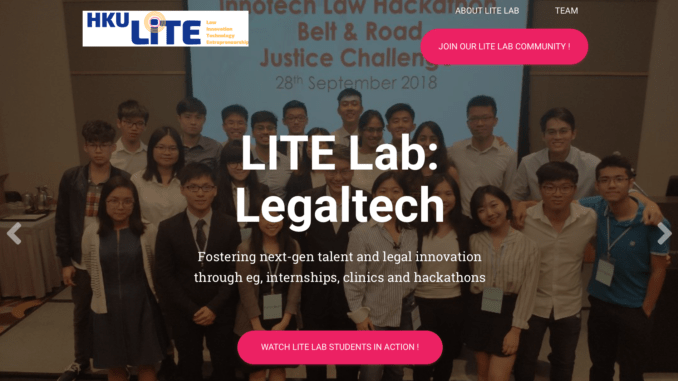
While legal tech and innovation projects in APAC centres such as Singapore are now well-known, Hong Kong has not received as much attention. So, Artificial Lawyer was pleased to catch up with Brian Tang, Founding Executive Director of the LITE Lab (Law, Innovation, Technology and Entrepreneurship) programme, which is based at the University of Hong Kong’s Faculty of Law.
Tang explained what LITE Lab does, what the legal tech scene is like in Hong Kong, and what his hopes are for further collaboration with law firms and tech experts around the world.
—
What is LITE Lab? What is its objective?
LITE Lab is a new interdisciplinary and experiential programme led by the University of Hong Kong’s highly ranked Faculty of Law in conjunction with the Department of Computer Science, to foster law, innovation, technology and entrepreneurship (LITE).
LITE Lab seeks to address the future of the legal profession and training for future lawyers, legal service delivery and access to justice, and supporting Hong Kong’s startup and social entrepreneur ecosystem.
Foundational classes focus on business models, legal design thinking and computational/algorithmic thinking, before covering substantive law in entrepreneurship and startup law and practice. Assessment design is based on experiential and interdisciplinary learning, agency and impact, with:
(1) first-hand experience creating legal tech products (initially using no code platforms), such as legal explainers, document assembly and chatbots.
(2) an externship style student experience on a curated research or legal tech project for one or more tech startups.
LITE is offered as part of HKU’s new interdisciplinary Bachelor of Arts and Science degrees in Fintech (led by the Department of Computer Science and Faculty of Business and Economics) and Design+ (led by the Faculty of Architecture), and has about 40 undergraduate students in its inaugural cohort, who comprise single and double degree undergraduate students from a range of seniority majoring mainly in law, but also computer science, business and design.
Please tell us about yourself.
I was born in Singapore, raised in Australia, where I graduated from the University of Western Australia and articled at Mallesons (as it then was – now King & Wood Mallesons) in Perth before getting an LLM from NYU.
I then joined white shoe Wall Street law firm Sullivan & Cromwell in New York, and as a mid-level associate, worked in Silicon Valley during the dot.com boom and assisted to set up the firm’s Palo Alto office.
In Hong Kong I worked at Credit Suisse and then established ACMI (Asia Capital Markets Institute). In 2018, ACMI and I organised the Global Legal Hackathon in Hong Kong hosted at Thomson Reuters, and the top Hong Kong team made it to the finals in New York, and won. That was one of the reasons that led to me being invited to lead the LITE Lab initiative.
I also recently helped organise the LegalRegTechHack in conjunction with Global Legal Hackathon 2019.
How do lawyers in Hong Kong, and mainland China, see legal tech? Is there a different approach?
Hong Kong’s private sector market is bifurcated between international corporate firms, some of which practise Hong Kong law as well, and local firms. You can see the breakdown and an initial analysis in my chapter on Hong Kong in the 2019 State of Legal Innovation in Asia Pacific (August 2019).
Under the One Country Two Systems approach, Hong Kong’s legal system remains British-style Common Law, based on a separation of powers, as compared to mainland China’s civil law, socialist legal system.
The approach to legal tech differs greatly between Hong Kong and mainland China. For example, in mainland China, there is an increased focus on legal tech for online dispute resolution. And even within Hong Kong itself, the attitude and adoption levels differ greatly between international firms and local firms.
Legal tech is emerging in Hong Kong, with cloud legal software solution providers, [such as] Zegal (formerly Dragon Law) which is growing ever since being founded in 2013 in Hong Kong and is now expanding into Singapore, Australia, New Zealand, and the United Kingdom.
eDiscovery has also been a burgeoning business in Hong Kong, where recent local securities regulatory and the United States Foreign Corrupt Practices Act investigations have driven its adoption, as have cross-border data transfer issues.
And, the judiciary has been developing in phases its Informational Technology Strategy Plan to provide an electronic option for the handling of court-related documents, including an Integrated Court Case Management System.
What do you hope for the future of the legal profession in Hong Kong?
To begin with, I hope to grow greater awareness of and interest in the possibilities that legal innovation and technology can bring to the delivery of legal services and access to justice.
I recently wrote a short article for Hong Kong Lawyer (the official publication of the Hong Kong Law Society) on Three Mindsets that Lawyers Need for the Technology Era, namely being client-centric, process-conscious and technology-friendly.
As awareness and interest increases, I would love to explore more co-creation of solutions with private practitioners, corporate counsel, government counsel, regulators and the judiciary. We have some exciting initiatives to come.
In the meantime, we are organising World Regtech Summit@HK on November 5 in conjunction with Hong Kong Fintech Week and Hong Kong’s Legal Week to invite regtechs from around the world to share their solutions with Hong Kong’s regulated entities, regulators and advisors.
(You can sign up for the event here.)
In my capacity as co-chair of the Fintech Association of Hong Kong’s Regtech Committee, we have previously organised Regtech Live! editions that focussed on Know Your Customer (KYC) and Anti-Money Laundering (AML), as well as on Artificial Intelligence.
Thanks, Brian! Sounds like there is plenty going on in Hong Kong when it comes to legal innovation. Keep up the great work.
—
Below is a description of two of the LITE Lab@HKU courses
LITE Lab@HKU Course Video Introduction: https://youtu.be/KXcU4ANQtDs
Hong Kong University – Faculty of Law
Course title: Law, Innovation, Technology and Entrepreneurship (LITE)
Location: Hong Kong SAR, China
Type of Course: Law Faculty academic undergraduate elective – experiential learning
Length: The 2019-2020 academic offering is a first semester course of 12 weeks meeting 3 hours each week
Fee: Normal
Description: LITE Lab@HKU is a new interdisciplinary and experiential programme led by University of Hong Kong’s highly ranked Faculty of Law in conjunction with the Department of Computer Science to foster law, innovation, technology and entrepreneurship (LITE): https://lite.law.hku.hk/ . LITE Lab@HKU seeks to address the future of the legal profession and training for future lawyers, legal service delivery and access to justice and supporting Hong Kong’s startup and social entrepreneur ecosystem. Foundational classes focus on business model canvas, legal design thinking and computational/algorithmic thinking before covering substantive law in entrepreneurship and startup law and practice. Assessment design is based on experiential and interdisciplinary learning, agency and impact, with first-hand experience creating legaltech products (initially using no code platforms), such as legal explainers, document assembly and chatbots.
Contact: bwtang@hku.hk
–
Course title: Law, Innovation, Technology and Entrepreneurship (LITE) Lab
Location: Hong Kong SAR, China
Type of Course: Law Faculty academic undergraduate elective – experiential learning
Length: The 2020 academic offering is a second semester course of 12 weeks meeting 3 hours each week
Fee: Normal
Description: LITE Lab@HKU is a new interdisciplinary and experiential programme led by University of Hong Kong’s highly ranked Faculty of Law in conjunction with the Department of Computer Science to foster law, innovation, technology and entrepreneurship (LITE): https://lite.law.hku.hk/ . LITE Lab@HKU seeks to address the future of the legal profession and training for future lawyers, legal service delivery and access to justice and supporting Hong Kong’s startup and social entrepreneur ecosystem. Foundational classes focus on business model canvas, legal design thinking and computational/algorithmic thinking before covering substantive law in entrepreneurship and startup law and practice. Assessment design is based on experiential and interdisciplinary learning, agency and impact, with an externship style student experience on a curated research or legaltech project for one or more tech startups.
Contact: bwtang@hku.hk

3 Trackbacks / Pingbacks
Comments are closed.